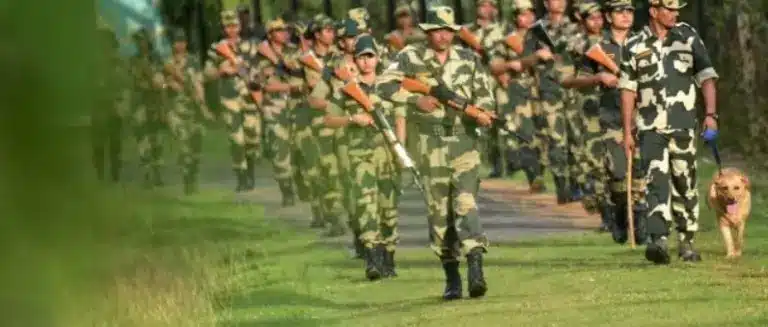What’s in today’s article?
- Why in news?
- What is Border Security Force (BSF)?
- Background: Expansion of the jurisdiction of BSF
- From which law the Centre draws its authority to take such step?
- Need for such step
- News Summary: The issue of expansion of BSF jurisdiction
Why in news?
- The Supreme Court is set to hear the dispute over the expansion of the Border Security Force (BSF) jurisdiction in Punjab.
- In October2021, the Ministry of Home Affairs issued a notification expanding the jurisdiction of the BSF in Punjab, West Bengal and Assam.
- This was challenged by the Punjab government the following December.
Border Security Force (BSF)
- About
- It is one of the seven Central Armed Police Forces (CAPF) of India and was raised in December 1965.
- It was raised in the wake of the 1965 War to ensure the security of the borders of India.
- It is the only CAPF which has its own Water Wing, Air Wing and other ancillary units.
- The Force Headquarters is in New Delhi.
- It works under the administrative control of Ministry of Home Affairs.
- Its operational responsibility is spread over 6,386.36 km of International Border with Pakistan and Bangladesh.
- It is one of the seven Central Armed Police Forces (CAPF) of India and was raised in December 1965.
- Operations:
- Peace Time Role
- Prevent trans-border crimes, unauthorized entry into or exit from the territory of India.
- Prevent smuggling and any other illegal activity.
- War Time Role
- Protection of vital installations particularly air-fields
- Limited aggressive action against Para military or irregular forces of the enemy within the overall plan of the Armed forces
- Assistance in control of refugees
- Overseas Deployment:
- BSF contributes its personnel every year for UN Missions.
- It is handling the security issues on the famous Kartarpur Corridor.
- Other roles
- It is also deployed on Line of Control (LoC) in J&K under the Operational control of the Army.
- At the time of natural disaster/calamities, BSF provides assistance in areas of deployment such as:
- Kashmir flood in 2014,
- Kerala flood in 2018 and
- Kedarnath Tragedy in 2013.
- Power to arrest, search and seize
- BSF is empowered to arrest, search and seize under a number of laws, such as the Criminal Procedure Code, the Passports Act 1967, the Passport (Entry into India) Act 1920, and the NDPS Act, to name a few.
- Peace Time Role
Background: Expansion of the jurisdiction of BSF
- Earlier, the BSF could exercise its powers within 15 kilometres of the border in Punjab, West Bengal and Assam.
- Later, through a notification issued in October 2021, the Centre expanded this to within 50 kilometres of the border.
- The notification states that, within this larger 50-kilometre jurisdiction, the BSF can only exercise powers under the Criminal Procedure Code, the Passport (Entry into India) Act and the Passports Act.
- For other central legislations, the 15-km limit remains.
From which law the Centre draws its authority to take such step?
- Section 139 of the Border Security Force Act, 1968, empowers the Centre to notify the area and extent of border force’s operational mandate.
- Every order (notification) made under Section 139 of this act must be subsequently laid before each house of Parliament.
- Using this act, Centre issues notification revising the ‘Schedule’ specifying the border stretch where BSF would have powers of search, seizure and arrest.
Need for such step
- To improve operational efficiency and crack down on smuggling rackets
- Punjab has the problem of drugs and arms smuggling. Similarly, Assam and West Bengal face the issue of cattle and fake currency smuggling.
- These borders are also prone to illegal migration.
- To counter the security challenges
- This expansion was in response to the increased use of drones and Unmanned Aerial Vehicles.
- These technologies have long-range capabilities and enable surveillance and the smuggling of arms and fake currency.
- To make jurisdiction of BSF uniform across states
- The notification makes the BSF jurisdiction uniform across states, as the 50-kilometre limit was already in place in Rajasthan.
- The same notification reduced the jurisdiction in Gujarat from 80 km to 50 km.
News Summary: The issue of expansion of BSF jurisdiction
- The state of Punjab filed an original suit against the central government in the Supreme Court in December 2021 against the expansion of the jurisdiction of the BSF.
- The Supreme Court has original jurisdiction in disputes between the central government and states under Article 131 of the Constitution.
- This means cases of this kind can only be heard for the first time at the SC to the exclusion of any other court.
- The Punjab govt claimed that expanding the jurisdiction would compromise the state’s exclusive powers to legislate on matters involving the police and public order.
- These powers are provided in Entries 1 and 2 of the State List under Article 246 of the Constitution.
- They also claimed that the notification was issued without consulting with any of the states concerned.
Q1) What is the original jurisdiction of Supreme Court?
The Supreme Court of India’s original jurisdiction is covered under Article 131. It includes disputes between: the Indian government and one or more states and the Indian government and one or more states on one side and one or more states on the other side.
Q2) What is the Criminal Procedure Code?
The Code of Criminal Procedure (CrPC) is a procedural law that provides due process to the accused. It was enacted in 1973 and came into force on April 1, 1974.
Source: Why Punjab moved SC against the expansion of BSF jurisdiction | BSF | Times of India
Last updated on February, 2026
→ UPSC Notification 2026 is now out on the official website at upsconline.nic.in.
→ UPSC IFoS Notification 2026 is now out on the official website at upsconline.nic.in.
→ UPSC Calendar 2026 has been released.
→ UPSC Final Result 2025 is expected to be released in the first week of March 2026.
→ Check out the latest UPSC Syllabus 2026 here.
→ Join Vajiram & Ravi’s Interview Guidance Programme for expert help to crack your final UPSC stage.
→ UPSC Mains Result 2025 is now out.
→ UPSC Prelims 2026 will be conducted on 24th May, 2026 & UPSC Mains 2026 will be conducted on 21st August 2026.
→ The UPSC Selection Process is of 3 stages-Prelims, Mains and Interview.
→ Prepare effectively with Vajiram & Ravi’s UPSC Prelims Test Series 2026 featuring full-length mock tests, detailed solutions, and performance analysis.
→ Enroll in Vajiram & Ravi’s UPSC Mains Test Series 2026 for structured answer writing practice, expert evaluation, and exam-oriented feedback.
→ Join Vajiram & Ravi’s Best UPSC Mentorship Program for personalized guidance, strategy planning, and one-to-one support from experienced mentors.
→ Check UPSC Marksheet 2024 Here.
→ UPSC Toppers List 2024 is released now. Shakti Dubey is UPSC AIR 1 2024 Topper.
→ Also check Best UPSC Coaching in India


















